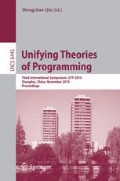Abstract
Hoare and He’s approach to unifying theories of programming, UTP, is a dozen years old. In spite of the importance of its ideas, UTP does not seem to be attracting due interest. The purpose of this article is to discuss why that is the case, and to consider UTP’s destiny. To do so it analyses the nature of UTP, focusing primarily on unification, and makes suggestions to expand its use.
Access this chapter
Tax calculation will be finalised at checkout
Purchases are for personal use only
Preview
Unable to display preview. Download preview PDF.
References
Back, R.-J.R., von Wright, J.: Refinement calculus, Part I: Sequential nondeterministic programs. In: de Bakker, J.W., de Roever, W.-P., Rozenberg, G. (eds.) REX 1989. LNCS, vol. 430, pp. 42–66. Springer, Heidelberg (1989)
Back, R.-J.R., von Wright, J.: Duality in specification languages: a lattice-theoretical approach. Acta Informatica 27(7), 583–625 (1990)
Backus, J.W., et al. (eds.): Revised report on the algorithm language algol 60; CACM, 6(1), 1–17 (1963) (Supplement by M. Woodger, 18–20)
Bjørner, D., Jones, C.B.: The Vienna Development Method: The Meta-Language. LNCS, vol. 61. Springer, Heidelberg (1978)
Cutland, N.J.: Computability: An Introduction to Recursive Function Theory. Cambridge University Press, Cambridge (1980)
Diacu, F.: The solution of the n-body problem. The Mathematical Intelligencer 18, 66–70 (1996)
Dijkstra, E.W.: Guarded commands, nondeterminacy and formal derivation of programs. Communications of the ACM 18, 453–457 (1975)
Duke, R., Rose, G.: Formal Object-Oriented Specification Using Object-Z. Macmillan Press, Basingstoke (2000)
Dunne, S., Stoddart, W. (eds.): UTP 2006. LNCS, vol. 4010, pp. 123–140. Springer, Heidelberg (2006)
Eliot, T.S.: Four Quartets. Harcourt, Inc., New York (1943)
Gardiner, P.H.B., Martin, C.E., de Moor, O.: An algebraic construction of predicate transformers. In: Bird, R.S., Woodcock, J.C.P., Morgan, C.C. (eds.) MPC 1992. LNCS, vol. 669, pp. 100–121. Springer, Heidelberg (1993)
Hayes, I.J. (ed.): Specification Case Studies. Prentice-Hall International, Englewood Cliffs (1987)
Hehner, E.C.R.: Predicative programming, parts I and II. Communications of the ACM 27(2), 134–151 (1984)
Hoare, C.A.R., Wirth, N.: An axiomatic definition of the programming language Pascal. Acta Informatica 2(4), 335–355 (1973)
Hoare, C.A.R., et al.: The laws of programming. Communications of the ACM 30(8), 672–686 (1987)
Hoare, C.A.R.: A theory for the derivation of combinational C-MOS circuit designs. Theoretical Computer Science 90(1), 235–251 (1991)
Hoare, C.A.R., He, J.: Unifying Theories of Programming. Prentice Hall, Englewood Cliffs (1998)
Houston, I., King, S.: CICS project report: Experiences and results from the use of Z in IBM. VDM Europe 1, 588–596 (1991)
Josephs, M.B.: Receptive process theory. Acta Informatica 29(1), 17–31 (1992)
Jerome Keisler, H.: Elementary Calculus: An Infinitesimal Approach, 2nd edn. Prindle, Weber and Schmidt (1986)
Knuth, D.E.: The remaining troublespots in algol 60. Communications of the ACM 10(10), 611–617 (1967)
Lister, A.M.: Fundamentals of Operating Systems, 2nd edn. Macmillan, Basingstoke (1979)
Lucas, P., Walk, K.: On the formal description of PL/I. In: Halpern, M.I., Shaw, C.J. (eds.) Annual Review in Automatic Programming, vol. 6, pp. 105–182. Pergamon Press, Oxford (1971)
McIver, A.K., Morgan, C.C.: Abstraction, Refinement and Proof for Probabilistic Systems. Springer, Heidelberg (2005)
Milne, R., Strachey, C.: A Theory of Programming Language Semantics. Chapman and Hall, Boca Raton (1976)
Milner, R.: Communication and Concurrency. Prentice Hall, Englewood Cliffs (1989)
Mitchell, J.C.: Foundations for Programming Languages. MIT Press, Cambridge (1996)
Morgan, C.C.: Programming from Specifications, 1st edn. Prentice-Hall International, Englewood Cliffs (1990)
Morris, J.M.: A theoretical basis for stepwise refinement and the programming calculus. Science of Computer Programming 9(3), 287–306 (1987)
Nauer, P. (ed.): Report on the algorithmic language algol 60. Communications of the ACM 6, 299–314 (1960)
Nelson, G.: A generalisation of Dijkstra’s calculus. ACM Transactions on Programming Language and Systems 11(4), 517–561 (1989)
Nielsen, F., Nielsen, H.R., Hankin, C.: Principles of Program Analysis. Springer, Heidelberg (2005)
Rewitzky, I.M.: Binary Multirelations. In: de Swart, H., Orłowska, E., Schmidt, G., Roubens, M. (eds.) TARSKI 2003. LNCS, vol. 2929, pp. 256–271. Springer, Heidelberg (2003)
Rewitzky, I.M., Sanders, J.W.: Involutions on relational program calculi. Scientific Annals of Computer Science 18, 129–171 (2008)
de Roever, W.-P., Engelhardt, K.: Data Refinement: Model-Oriented Proof Methods and their Comparison. Cambridge Tracts in Theoretical Computer Science. Cambridge University Press, Cambridge (1998)
Roscoe, A.W., Hoare, C.A.R.: The laws of occam programming. Theoretical Computer Science 60(2), 177–229 (1988)
Roscoe, A.W.: The Theory and Practice of Concurrency. Prentice-Hall, Englewood Cliffs (1998)
Spivey, J.M.: The Z Notation: A Reference Manual, 2nd edn. Prentice-Hall International, Englewood Cliffs (1992)
van Wijngaarden, A., et al.: Revised report on the algorithmic language algol 68. Acta Informatica 5, 1–236 (1975)
Wikipedia on the competition between VHS and Betamax, http://en.wikipedia.org/wiki/Videotape_format_war
Author information
Authors and Affiliations
Editor information
Editors and Affiliations
Rights and permissions
Copyright information
© 2010 Springer-Verlag Berlin Heidelberg
About this paper
Cite this paper
Chen, Y., Sanders, J.W. (2010). UTP and Sustainability. In: Qin, S. (eds) Unifying Theories of Programming. UTP 2010. Lecture Notes in Computer Science, vol 6445. Springer, Berlin, Heidelberg. https://doi.org/10.1007/978-3-642-16690-7_2
Download citation
DOI: https://doi.org/10.1007/978-3-642-16690-7_2
Publisher Name: Springer, Berlin, Heidelberg
Print ISBN: 978-3-642-16689-1
Online ISBN: 978-3-642-16690-7
eBook Packages: Computer ScienceComputer Science (R0)

